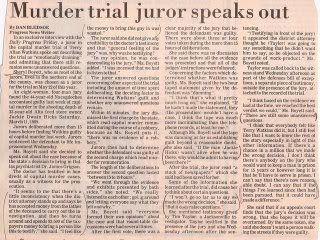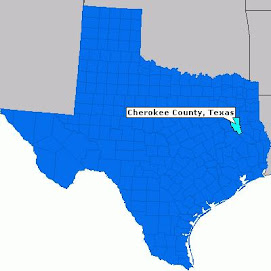Rusk Texas:
City of Rusk TX police officer, and former Cherokee County Sheriff Department jailer,
Christopher "Chris" Michael Hennessy was handed a 10 year probation sentence by
Cherokee County TX District Attorney Elmer C. Beckworth, Jr. in 2004 after
Hennessy sexually assaulted a female 15-year-old Rusk ISD student. Officer Hennessy absconded his Sex Offender Registration after later being charged with distribution of crystal meth and unauthorized use of a motor, according to a
February 28, 2008 article in the Jacksonville Daily Progress. Rusk TX officer Chris Hennessy was also under investigation by the ATF for possession of explosives.
Officer Christopher Michael Hennessy was apprehended in Houston, TX by the US Marshals Service on Wednesday February 27, 2008. Hennessy had been working in the Houston area under an assumed name.
Cherokee County Texas Criminal Docket; Case 16121
:
Indecency/Sexual Assault of Child-Felony
THE STATE OF TEXAS vs HENNESSY, CHRISTOPHER MICHAEL
Filed 05/23/2005 - Disposition: 11/17/2005 Deferred adjudication
2nd District Court, District Clerk, Cherokee County TX.
And Criminal Docket Case 16681; Case 16682 in the 2nd District Court, Cherokee County, TX.
Obviously Hennessy's
deferred adjudication wasn't good enough for the rogue officer; deferred adjudication is a plea bargain agreement, as it is defined, that is not an formal guilty plea and is NOT a conviction. The charge remains on the defendant's record, however all licensing, bonding and law enforcement, i.e. political affiliations remain untarnished if probation is served (or reduced by a sympathetic district judge).
Christopher Hennessy (Courtesy DPS)
Hennessy refused his Sex Offender Registration in Cherokee County, TX and violated his slap-on-the-wrist probation. The Cherokee County district judge would have terminated his probation; however
Hennessy would have to first register as a Sex Offender. Officer Hennessy was 24 in 2004.
Elmer Beckworth believed Officer's Hennessy's reputation was more valuable than the raped 15-year-old Rusk Jr. High student by offering DEFERRED ADJUDICATION probation. Of course, the Cherokee County District Attorney is not held accountable in the local media for any of the COLLATERAL CONSEQUENCES of Chris Hennessy's plea bargain; allowing
Hennessy to continue the crystal meth trafficking into
Beckworth's hometown, possible bomb making and who knows what else before Officer Hennessy was nabbed by the
Gulf Coast Violent Offenders Task Force.
Alto Texas: US Postmaster Herbert Michael Dominguez located in the tiny Alto, TX post office stole $27,000 worth of postage stamps and federal money orders, converting them into his own personal use. Similarly Dominguez's indictment and crime was not reported by any Cherokee County Texas newspaper. It took the Tyler Texas paper to report the local indictment of
Postmaster Dominquez in its February 27, 2008 issue. Dominguez had been being paying most of the stolen money back in restitution. U.S. Federal District Judge Michael Schneider in Tyler TX gave the thieving Postal Service agent 1 year adjudicated probation.

What do these cases have in common? A
Rusk TX police officer who molested a Jr. High girl and an unsupervised Postmaster in
Alto TX both received deferred adjudicated probation for their crimes, both State and Federal. Both get to keep their TCLEOSE licenses and government pensions. Probation given in order to keep the sordid mess under wraps. Even after raping the coffers and thus taxpayers of their most precious commodity: their children and their privacy.
Criminal activity within Cherokee County's post offices has been documented for years. In August 1997, DPS officer
Joe Don Abernathy was lucky enough to have DWI and unlawful discharge of a weapon charges dismissed after an employee in the
Rusk Texas post office smashed his vial of blood on it way to the Garland, TX DPS lab for alcohol tests.
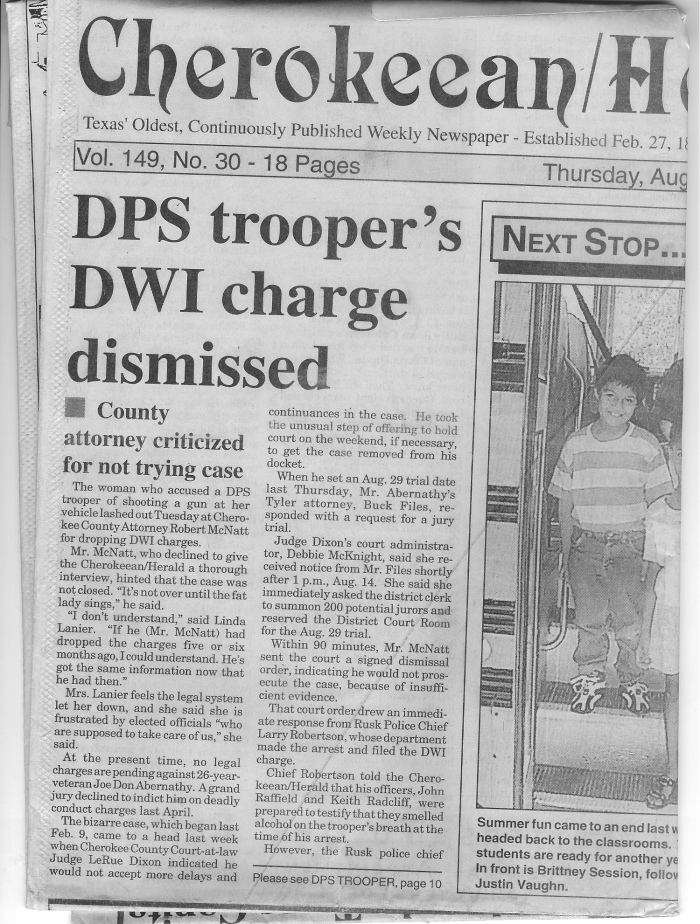
Aug. 21, 1997
Cherokeean Herald p.1

Aug. 21, 1997
Cherokeean Herald p. 10A
A local Rusk TX woman named
Linda Lanier had filed a complaint against
Trooper Joe Don Abernathy in Feb. 1997 after Abernathy had chased the Lanier family down the back roads of Hwy. 84 in the middle of the night. The complaint stated the off duty trooper had shot at the Lanier family vehicle, on their way back from Boosier City, LA. The Rusk PD arrested Abernathy on U.S. 69 and found rifles, a shotgun and beer cans in Abernathy's pickup. Abernathy requested a blood sample be drawn in lieu of a breathalyzer, and the sample was literally dropped off in the mail. The test tube containing the DUI arrest evidence was destroyed by the Rusk TX Postal Service.
A common tactic observed with the roles have been reversed and a DPS officer cites a Cherokee County deputy for DUI. And of course the Cherokee County TX District Attorney's office never took Abernathy's "
deadly conduct" case in front of a grand jury.
Trooper
Joe Don Abernathy accepted Cherokee County's County Attorney's offer of reckless driving as was placed on minimal adjudicated probation. The horror the Lanier family endured the night of Feb. 9, 1997 has been long forgotten.
Trooper Joe Abernathy presently works as a Senior Recruiter for the DPS office in Tyler, TX.
In 2012, Trooper Joe Don Abernathy crashed his patrol car after a night of heavy drinking according to the Tyler Paper. The DPS pulled a blood draw showing over an alcohol level of 0.16 which is twice the legal limit. (Courtesy Tyler Paper).
Trooper who said he swerved to avoid a deer arrested for DWI
BY KENNETH DEAN
A former Texas Department of Public Safety trooper, who told his coworkers he wrecked his patrol car earlier this month while trying to avoid a deer, has been arrested for driving while intoxicated and resigned his position as a result of the investigation into the accident.
Joe Don Abernathy, 61, turned himself into authorities Monday and posted a $1,000 bond on the misdemeanor charge, according to judicial records.
Abernathy, who reportedly was on his way to work the morning of the accident, wrecked the 2008 Ford Crown Victoria he was assigned about 7:20 a.m. Nov. 5 on County Road 2120, about a half-mile west of County Road 262.
According to a DPS accident report, Abernathy said he was driving when a deer ran out in front of him, and he took evasive action to avoid hitting the animal.
The Tyler Morning Telegraph asked for video of the deer crossing the road the morning of the accident but was told the DPS video system does not record until the overhead emergency lights have been activated.
The DPS report by Investigator David Anthony shows Abernathy swerved to the right, went off the road, across into oncoming traffic and then back off the right side of the roadway where he struck several trees.
According to the arrest affidavit in the case, Abernathy had a strong odor of alcohol on his person.
However, because he was injured, Abernathy was taken to Mother Frances Hospital for treatment, where doctors also took his blood for testing.
The DPS crash report indicates Abernathy's blood alcohol level was 0.16, which is twice the legal limit.
Smith County District Attorney Matt Bingham said he was notified early in the investigation and told by troopers on the scene that they would be having Abernathy's blood drawn for testing.
“DPS has been very cooperative from the onset of the investigation, and they have said they will give my office any and all records with Abernathy. It's very unfortunate that something like this can stain the reputation of all of these troopers, but he will be treated like everyone else,” he said.
Bingham said he is looking at a possible earlier incident involving Abernathy where a blood vial had been destroyed.
“There was an earlier case involving Abernathy and a blood vial being destroyed somehow, but that was in another county outside Smith County and had nothing to do with the DPS. It was an entirely different agency,” he said.
Tom Vinger, DPS media representative in Austin, said Monday that Abernathy had tendered his resignation the day after the accident earlier this month.
Vinger confirmed that Abernathy was en route to work when the accident occurred.
Vinger would not say what Abernathy's position at the Tyler DPS was before the accident or whether he was a patrol trooper or assigned to a desk.
Bingham said troopers worked Abernathy's case like a felony case instead of a misdemeanor.
“They did a full traffic reconstruction with their crew, which is usually only for fatalities and felony cases, so DPS went above what they usually do for a misdemeanor. He will be treated like anyone else in this case, because there is no special treatment,” he said.
 DPS Trooper Joe Don Abernathy
Rusk, TX:
DPS Trooper Joe Don Abernathy
Rusk, TX:
The personal use of public works by those assigned to protect and serve Cherokee County Texas has been covered up for decades. In a 1995
Cherokeean Herald article,
Cherokee County Sheriff James Campbell denied his deputies partake in monitoring and recording inmates' jailhouse pay phone calls. Complete with an incredulous and concocted story on fictitious inmates crank calling witnesses from their cellblocks.

June 1, 1995 Cherokeean Herald p.1
Houston Chronicle article on jailhouse eavesdropping:
Jan. 5, 2002
Houston Chronicle article from the AP highlights the State's TDCJ policy of listening in and recording all jail inmates' conversations, as a required duty performed by all Texas penal systems -and those like
Sheriff James Campbell who are charged with doing so. In 1998 the TDCJ policy altered to allow privacy between inmates' phone calls and their attorney-client privileges. That policy has certainly been ignored by the Cherokee County Sheriff Department and District Attorney's office. Cherokee County also tells its citizens the Sheriff Department does not record its DETCOG established 911 calls either.
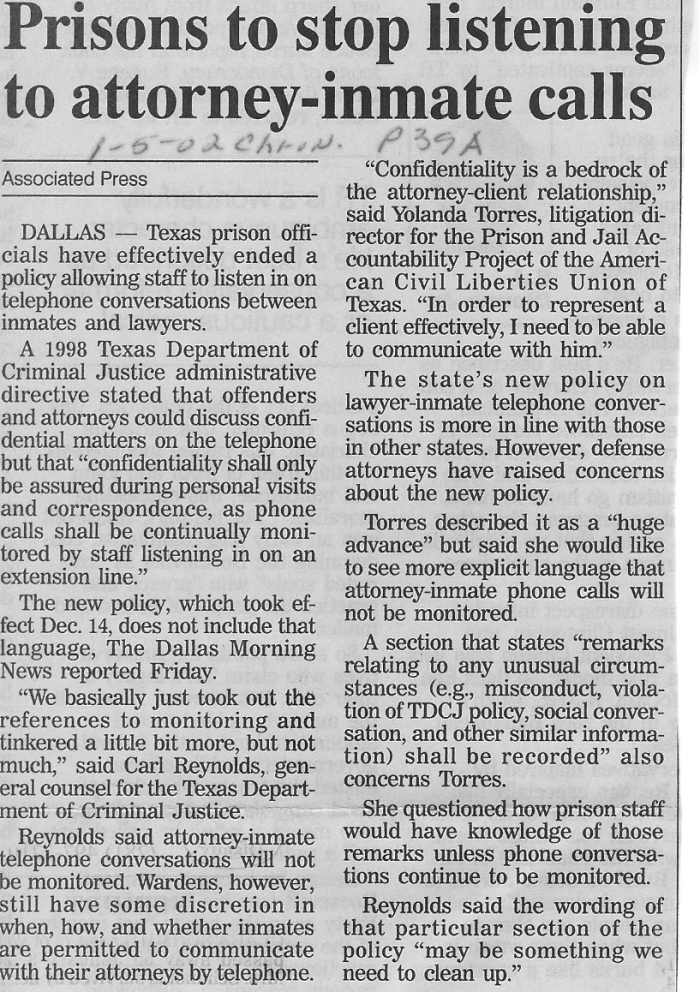
Jan. 5, 2002
Houston Chronicle p.39A
The June 5, 1995
Cherokeean article citing the "telephone harassment" of bored Cherokee County inmates and how the poor Sheriff can't "listen in" and put a stop to it - why that is a sharp contrast to the 12th Court of Appeals affirmation of one inmate's recent threatening phone call to his wife. The case
Kevin Wade Conner v. The State of Texas--Appeal from County Court at Law of Cherokee County was heard in Tyler on February 29, 2008 based upon the 'Dial H for Harassment' scenario that actually took place.
Kevin Conner was arrested in 2006 for public intoxication and during his one phone call to his wife, threatened to beat her up. Conner was subsequently charged with telephone harassment and the audio tape recorded phone conversation admitted into evidence at his trial, Cherokee County Court at Law (trial court case # 45,593).
Kevin Conner's attorney filed an appeal in Tyler, refer to Case
# 12-06-00311-CR, filed on 8/26/2006 in the 12th Court of Appeals, challenging the legality of tape recording the plaintiff's phone call and admitting it into evidence. The opinion states:
"The erroneous admission of the recording in question is nonconstitutional error. See King, 953 S.W.2d at 271. "Nonconstitutional" error that does not affect the substantial rights of the defendant must be disregarded. TEX. R. APP. P. 44.2(b). Such an error does not warrant reversal unless it had a substantial and injurious effect or influence in determining the jury’s verdict. See King, 953 S.W.2d at 271."
Note the Justices' made up word "Non-constitutional" that applies to Cherokee County phone tapping.
The 12th Court of Appeals doesn't get into the messy legality question as to whether it is legal or unconstitutional (nonconstitutional error / admission of egregious evidence, i.e. illegally gained evidence) to record jailhouse phone conversations. The deputy testified he "overheard" the threats that were decided not to be just "hearsay." And the Texas penal system allows jails to monitor the inmate accessible pay phones. That was good enough to admit the audio recording into evidence and convict Kevin Conner with "telephone harassment" based on the testimony of an eavesdropping deputy.
Even though
Sheriff James Campbell told the local newspapers in 1995 that the "law prohibits my deputies to listen in on" jailhouse phone calls. The Appellate Court says in 2008 recording and monitoring the Cherokee County Sheriff Department's phone calls are "pursuant to the jail’s standard policy, the call was recorded without notice to either Appellant [Kevin Conner] or Conner [his wife]."

June 1, 1995 Cherokeean Herald p.1
Wiretaps in the Liberty County TX courthouse, circa 2001:
Similarly, in 2001
Liberty County Texas Constable Craig Houghton and Liberty Courthouse maintenance chief
Thomas Neal Williford pleaded guilty to illegally wiretapping the courthouse telephones.
County Commissioner Pct. 4 Toby Wilburn allegedly provided recording devices for Williford,
et al to place on the phone lines of political adversaries within the courthouse.
Constable Craig Houghton and Thomas Williford both were sent to 3 months in prison, and Commissioner Wilburn was acquitted in Nov. 2001 on wiretapping. Commissioner Wilburn claimed Constable Houghton had obtained a warrant from the court; the local jury bought the explanation of providing the phone surveillance equipment. Despite the fact that only the Department of Public Safety, the Texas Rangers and the FBI are the only entities that can legally monitor phone lines.
Prisons and jails are required to monitor inmates' calls and terminate the surveillance during conversations with their attorneys.
Constable Houghton and
Thomas Williford were sentenced to 3 months federal prison and 2 years probation according to the
Houston Chronicle. Both claimed the illegal phone taps were installed to "rid the courthouse of theft and corruption."
Rusk Texas:
Longtime
Rusk Texas ISD drama teacher
Harold Earl “Bo” Scallon was indicted by a Federal grand jury in Tyler on Tuesday March 4, 2008 for
possession and distribution of child pornography. The FBI raided the home of Harold Scallon in
Jacksonville in July 2007 on a federal warrant based on a tip and ongoing investigation by the
Longview TX police department. Scallon’s computer was seized, and alleged to contain illegal images of children engaged in sex. The
Rusk Texas drama coach faces 20 years federal prison and fines for each count of distribution of child porn.
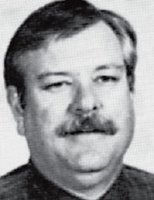 Rusk Texas teacher H.E. "Bo" Scallon
Rusk Texas teacher H.E. "Bo" Scallon
According to a
March 5, 2008 Tyler Paper article, federal prosecutors and the Rusk ISD superintendent's office refused to acknowledge that
Harold "Bo" Scallon was employed in the drama department up until the time he was indicted in federal court for possession and distribution of child pornography. Local newspaper deliberately refer to the theater teacher as "former" and "EX-teacher" even though
Harold Scallon never formerly retired from the
Rusk Texas school district. Conflicting dates of the alleged cyber crime are being reported. 2007
Rusk ISD Valedictorian
Kinsey Gresham acknowledged Mr. Scallon's presence in his students' and fellow faculty members' lives during her June 2007 graduation speech. "Bo" Scallon had worked over 30 years for the Rusk Texas Independent School District. He also monitored the Rusk Youth Center Swimming Pool with Sheriff James Campbell and others.

In March 2007 another
Rusk Texas and former
Jacksonville ISD teacher, Social Studies'
Brian Edward Basse, was indicted for indecency with a minor, i.e. one of his 16-year old students. (
KLTV) Basse was sentenced to 3 years in prison for indecency with a child and the illegal student/teacher relationship (
Daily Progress). He is a lifetime registered sex offender.
 Brian Basse, courtsey DPS
Brian Basse, courtsey DPS
Out of county company representatives and those seeking open-records in the Cherokee County Texas courthouse may have experienced the frequent violation of the Texas Public Information Act. That is those requesting court records having to sign waivers or being asked for their own personal information before the court employee provides the requested documents. An article in the Dec. 30, 2002
Houston Chronicle titled
"East Texas public data often elusive" shows East Texas law agencies were the least helpful and most confrontational when it came to providing citizens access to open records.
County governments out of a 14 county survey conducted over a 4 month period in 2002, where shown to be cooperative in complying with the State's open records laws. However, East Texas sheriff or police departments "resisted producing records 68% of the time" and complied with the State's timeline for requests only 38% of the time. One researcher from the journalism department of UT Tyler was told she had to "earn the right to see documents see requested." This is, unfortunately, the majority mindset of East Texan law enforcement.
The Public Information Act states that any and all information regarding an arrest record and the name of the complainant are to be made available to the inquiring public. Texas law enforcement records are not exempt from public disclosure. Nor are property records at the Cherokee County courthouse.

Companies contemplating setting up operations in greater East Texas should consider the light sentencing for sexual assault of a minor by police officers, embezzlement of postal services and city government funds, road rage by a repeat drunken veteran DPS officer and the bonafide illegal wiretapping of constables and commissioners. The articles may be hidden in the news archives and the back of the minds of the residents; however they are the forefront of daily operations in Counties steeped in corruption.
The disparate sentencing of minorities versus law enforcement caught red-handed and judgments against national companies should be thoroughly investigated by any business testing the job market in Cherokee County Texas. Company business calls will be intercepted, company mail rifled through by post office employees, their profits stolen via lawsuits and most importantly their children will be at risk from Cherokee County's
Rogues Gallery of child molesters enjoying their commuted probation.
As an April 29, 2007
Houston Chronicle article published by the
Seattle Post titled "
Civil Rights investigations decline as focus for FBI" states: for federal agencies keeping watch over rogue police officers, there has been in the last 5 years a 2/3rds drop in investigations of abusive police officers and hate crime purveyors. "You're going to have officers getting away with, in some cases, literally murder." Especially in East Texas where victims are portrayed as "nutcases" and/or transient drug addicts by the local media. And their stories buried with their remains in a nearby National Forest.

